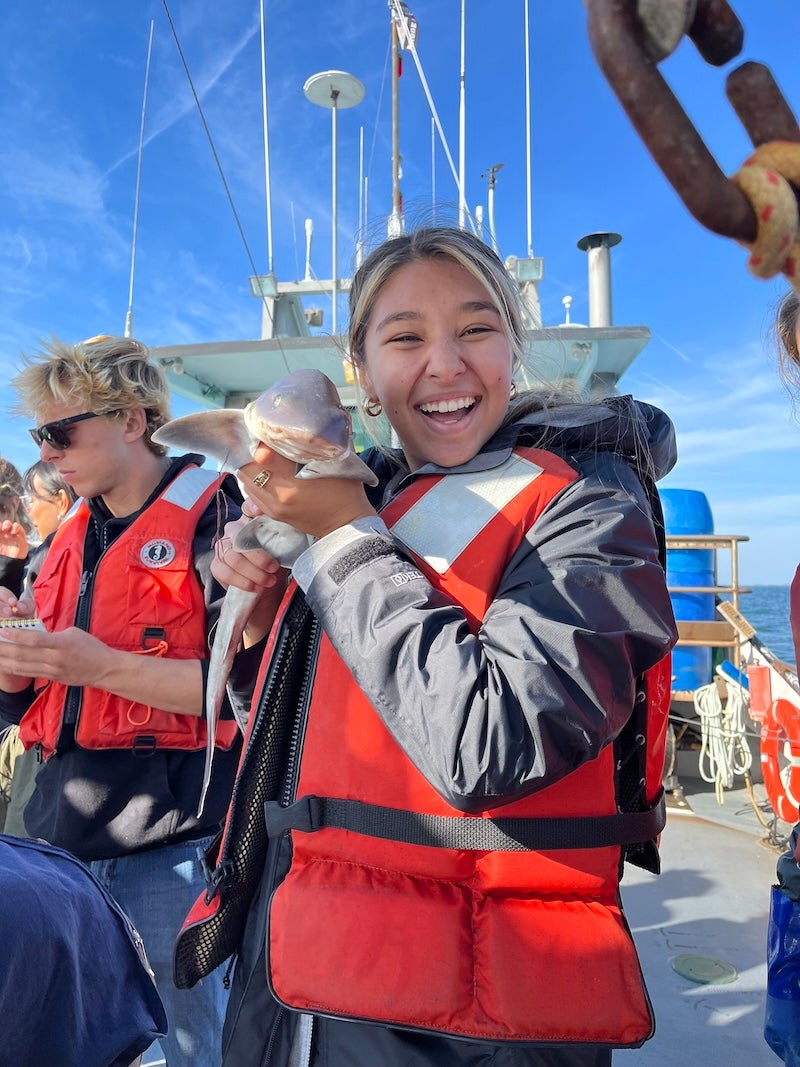Since stepping foot on campus, Brianna Pizzano has been making waves in her study of beluga whale behavior. Now in her senior year as a double major in animal science and marine biology, she has worked closely with Professor Justin Richard in his lab. “It has been an extremely fulfilling experience for me and has completely evolved my knowledge and opinions on animals in aquaria, animal behavior, and has made me think about how to convey knowledge in an accessible way,” she says. “It has been rewarding to research animals that have been minimally studied and to make sense of their behaviors in social and other contexts.”
Pizzano has always been interested in marine sciences and knew she wanted to work with animals. “I felt that taking classes in both majors would satisfy my interests and allow me to find something that I would want to pursue after undergrad,” she says of her decision to double major in marine biology and animal sciences. Her unique path of study has prepared her well for a future in conservation. Working alongside Richard has allowed her to develop critical skills needed in the veterinary field. “I think this research experience has helped improve my attention to detail, my ability to recognize patterns, and my ability to think critically. I think these skills will be crucial in the veterinary profession,” she says.
Working with Richard proved a worthwhile experience for Pizzano as she gained hands-on research experience and mentorship. “Dr. Richard has been an incredible mentor who has supplied me with the tools to think outside the box, ask questions, and find my own answers,” she says. She has connected her work to previous research in Richard’s lab that described how belugas can change the shape of the ‘melon’ on their head to communicate through visual displays. Pizzano recalls the first couple years in the lab being focused on coding open-mouth behaviors of the beluga whales. As the project evolved, she became more involved in the data collection and analysis, and she is even helping to write the paper documenting the beluga whale study. “As a junior, I became a project leader for the open mouth research project overseeing the data collection of related other variables,” she says. “I am now working on sections of the paper.”
When asked what key takeaways Pizzano has for people to understand her work on beluga whales and its importance, she shared three key points:
- Animals are very complex. Assumptions cannot be so easily made about animals in the wild or in human care without truly having an understanding of their behavior.
- Researching animals in the wild can be difficult, and having access to animals in human care provides scientists with so much insight and will better allow us to understand animals that are difficult to study in the wild.
- In addition, this kind of research may add to the science that contributes to conservation efforts and may provide clearer perspectives on how to save animals in the wild.
Pizzano has recently been accepted to several veterinary schools and plans to attend the University of Pennsylvania. Though unsure which specific path she plans to take within the veterinary sciences, she notes that she would like to enter research regarding preventive treatments for diseases and disorders, and hopes to make a positive impact in the field of wildlife conservation and shift public attitudes toward animals. “I hope to utilize the knowledge I acquire to make a difference and hopefully change people’s views about animals in general,” she says.
~ Written by Yvonne Wingard, CELS Communications Fellow

